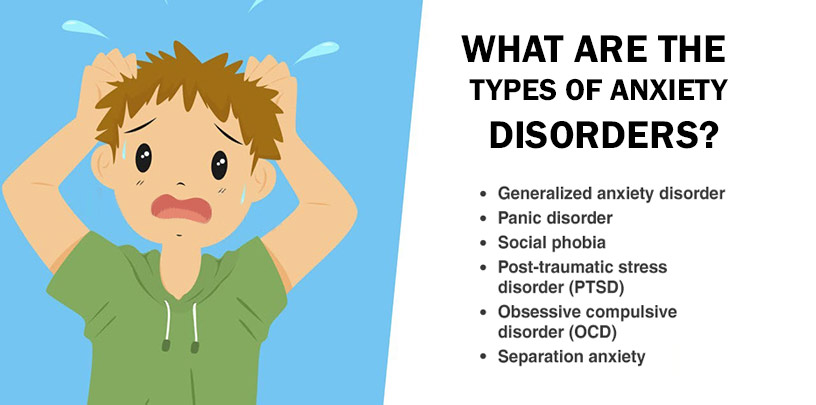
Table of Contents
What is Anxiety ?
Anxiety is a general condition that everybody has at some point in their life, whether it’s about meeting a new person, going for a job interview, moving to a new city, and other such life circumstances.
Some anxieties are even helpful; they help us react to potential threats or stresses by quickening our reflexes and focusing the attention. These types of anxiety usually settle down once the stressful situation is over.
Anxiety is when feelings of stress don’t go away and can’t seem to control them. Those feelings are extreme for the situation. When anxiety is severe, or it is there with you all the time, it makes it hard for you to come up with life.
The feelings of stress or anxiety are:
- Uncontrollable and quite intense
- Last for more than a couple of months or over years
- Negatively affects your health, behavior, and thoughts
- Leaves you are feeling distressed and unwanted
Anxiety can also cause physical symptoms like pounding heartbeats, pain, or stomach cramps. For some people, physical symptoms of anxiety can be the primary concern.
Anxiety may also affect other areas of life, such as your work performance, relationships, general behavior, and ability to cope.
Generally, people with anxiety also feel distressed. The symptoms of depression and anxiety overlap with each other.
The NIMH (National Institute for Mental Health) states that over 40 million people in the United States over the age of 18 are suffering from an anxiety-related disorder.
How Does Anxiety work ?
Anxiety triggers a flight-or-fight stress response in a person. It releases a stream of hormones and chemicals, such as adrenaline rush, in your system. In the short-term, anxiety increases your breathing and pulse rate so that the brain can get more oxygen. It happens to prepare you to have an appropriate response in an intense situation.
Several body parts are key actors in producing anxiety and fear. Scientists discovered that the hippocampus and the amygdala play significant roles in most anxiety disorders. The feelings of anxiety are a part of your body’s stress response. When you feel anxious, the system floods with cortisol and norepinephrine. Both give you a boost to reflexes, perception, speed in dangerous situations.
The amygdala alerts the brain that a threat is present and triggers an anxiety or fear response. The hippocampus encodes threatening events into memories. When the brain has a boost in these two parts, it causes anxiety and fear.
How to treat anxiety naturally ?
Some common natural and simple ways to reduce anxiety are:
- Exercise regularly and stay active
- Don’t take alcohol as it is a natural sedative
- Quit smoking
- Don’t take caffeine
- Get peaceful sleep
- Meditate regularly
- Eat a balanced and healthy diet
- Try deep breathing techniques
- Give a try to aromatherapy
- Drink chamomile tea frequently
Natural remedies for treating anxiety include :
- L-theanine or green tea
- Hops
- Valerian
- Lemon balm
- Passionflower
- Lavender
Which of the following is a common characteristic of all anxiety disorders ?
All the anxiety disorders, whether they are short-term or long-term, share some common characteristics such as:
- Fear, panic, or uneasiness
- Sleep problems
- Shortness of breath
- Not being able to stay calm
- Heart palpitations
- Cold, sweaty, or numb hands or feet
- Dry mouth
- Tense muscles
- Dizziness
- Nausea
What are the types of anxiety disorders ?
The major types of an anxiety disorder include:
Generalized Anxiety Disorder– GAD or generalized anxiety disorder is the occurrence of chronic anxiety and excessive tension or worry, even when there is nothing to provoke it. The symptoms of generalized anxiety disorder are an unrealistic view of problems, excessive worry, restlessness, irritability, headaches, muscle tension, sweating, and difficulty breathing.
Obsessive-Compulsive Disorder– OCD or obsessive-compulsive disorder is an anxiety disorder characterized by recurrent, unwanted obsessions or thoughts and repetitive behaviors or compulsions. The symptoms of obsessive-compulsive disorder are fear of losing control, fear of contamination, intrusive violent behavior or thoughts, and others.
Panic Disorder– Panic disorder is repeated unexpected episodes of intense fear. Panic disorder also accompanies physical symptoms such as heart palpitations, chest pain, dizziness, shortness of breath, or abdominal distress.
Post-Traumatic Stress Disorder – PTSD or post-traumatic stress disorder is an anxiety disorder that develops after exposure to a terrifying situation or ordeal. Traumatic events triggering PTSD include violent personal assaults, human-caused or natural disasters, military combat, accidents, and other such activities. The symptoms of post-traumatic stress disorder include re-experiencing the trauma, emotional numbness, and increased arousals such as feeling jumpy, trouble sleeping or concentrating, and irritability or anger.
Social Anxiety Disorder or Socio Phobia – Social anxiety disorder is the overwhelming anxiety and excessive self-consciousness in social situations of everyday life. Sociophobia maybe only for one type of situation such as eating or drinking in front of people, fear of speaking in a gathering, and other such everyday life events.
Written by Judy Francis
1 thoughts on “What are the Types of Anxiety Disorders?”
Leave a Reply Cancel reply

Coupon Code
Use Coupon CodeSALE10
Product Categories
- Buy Adderall Online
- Buy Adipex Online
- Buy Alprazolam Online
- Buy Ambien Online
- Buy Ativan Online
- Buy Carisoprodol Online
- Buy Clonazepam Online
- Buy Codeine Online
- Buy Darvocet Online
- Buy Demerol Online
- Buy Diazepam Online
- Buy Dilaudid Online
- Buy Fioricet online
- Buy Gabapentin Online
- Buy Hydrocodone Online
- Buy Hydromorphone Online
- Buy Klonopin Online
- Buy Lexapro Online
- Buy Lorazepam Online
- Buy Lorcet Online
- Buy Lortab Online
- Buy Meridia Online
- Buy Methadone Online
- Buy Modafinil Online
- Buy Norco Online
- Buy Opana ER Online
- Buy Oxycodone Online
- Buy Oxycontin Online
- Buy Percocet Online
- Buy Phentermine Online
- Buy Roxicodone Online
- Buy Soma Online
- Buy Suboxone Online
- Buy Subutex Online
- Buy Tapentadol Online
- Buy Tramadol Online
- Buy Valium Online
- Buy Viagra Online
- Buy Vicodin Online
- Buy Xanax Online
- Buy Zolpidem Online

What are the types of anxiety disorders? the site has helped me many times in health problems.